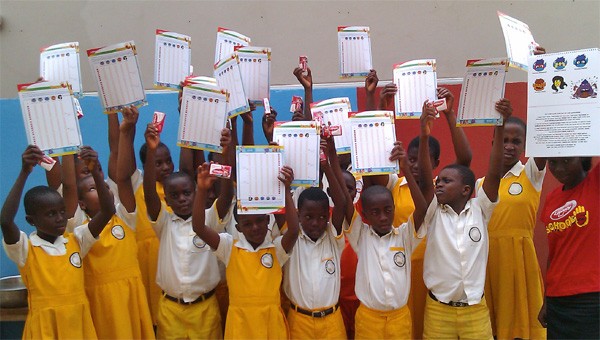
Ima of Kumasi, Ghana, gives new meaning to the saying, “The shoemaker’s children go barefoot.” This mother of four works as a public toilet attendant but lives in a house that lacks even the most basic latrine. Because of safety concerns, she and her family cannot walk to the public toilet after dark. They are forced to relieve themselves in plastic bags and dispose of them outside, a common practice that can spread disease. Ima is one of millions in West Africa whose lives are made more vulnerable by poor sanitation.
But now, USAID’s Sanitation Service Delivery Program (SSD), launched in October 2014, is increasing access to sanitation while helping people throughout the private sector to become sanitation entrepreneurs. The $15.8 million program is working to create a self-sustaining, private sector-fueled sanitation market in urban and peri-urban areas of Ghana, Cote d’Ivoire, and Benin. The goal is to bring first time sanitation to one million people within five years. It is one of the most ambitious programs to date in a region with an ever-growing need.
Fostering a Sanitation Macro-Environment
More than three quarters of people in Cote d’Ivoire and nearly nine out of ten people in Ghana and Benin lack access to improved sanitation. Most people rely on public toilets, which may be inadequate and unsanitary. Those with limited access to public toilets often resort to indiscriminate defecation in open spaces, dumps, and drains. This contributes to the spread of water-borne diseases such as diarrhea, which is one of the leading causes of death of children under 5 in sub-Saharan Africa.
Programs that provide infrastructure and mobilize people to build latrines through subsidies or trainings have seen results, but have struggled with sustainability. Oftentimes, the latrines break or gather dust from lack of use within just a few years. Additionally, methods such as community-led total sanitation, which have worked well in rural areas, have so far been less effective in urban areas with their large, segmented populations.
The Sanitation Service Delivery program is taking a new approach to improving urban and peri-urban sanitation by helping businesses in a range of industries – everything from banking to construction – to discover a largely untapped market. The program will show these businesses how they can profit from sanitation, help them enter the market, and forge connections between them, donors, and the government.
“Let’s say we have people who produce cement, we will work with them to find a way they can produce it for latrines for mass use,” explained Georgette Yarboi-Quayson, Environmental Policy Adviser at USAID/West Africa. “The aim is to foster a thriving macro-environment for sanitation enterprises.”
A Self-Sustaining Market
Convincing a range of private sector companies that it is in their financial interest to enter this stigmatized and largely untested market is a formidable task. To facilitate this process, the program is drawing on the knowledge of the nonprofit Water & Sanitation for the Urban Poor (WSUP), which has experience working with private businesses on sanitation issues in Ghana. WSUP is part of the program’s implementing coalition, which also includes Population Services International (PSI) and Program for Appropriate Technology in Health (PATH).
The program is leveraging WSUP’s knowledge of businesses in the region to make tailored appeals to them. “There is a lot of competition between banks and other businesses in this region so they are increasingly looking for unconventional products and markets, and we show them how sanitation can be a lucrative business,” said Musah Issaka Balima, WSUP Country Program Manager.
The approach is working. Unilever is already on board to ramp up efforts to market sanitation and hygiene in low-income areas of Ghana, and Fidelity Bank and the microfinance institution HFC Boafo have signed on to develop a platform for providing loans to finance sanitation.
Building on this success, the program is now working to convince private sector actors to not only in invest in sanitation, but to invest in sanitation for the extreme poor. “The extreme poor live day-to-day, so we must create a payment system that fits that while remaining profitable for the private sector,” Mr. Balima said.
SSD is working with sanitation suppliers to devise efficient, low-cost products that suit this challenging market. In addition, the program is working with governments to offer subsidies to businesses that provide sanitation for the extreme poor. The hope is that these subsidies will eventually become unnecessary as companies perfect their business models.
The program’s staff is optimistic that over time, this new market will alleviate this health crisis in a sustainable way and impact many people beyond the initial target of one million. SSD hopes to boost the incomes of everyone from executives to sanitation workers like Ima by making their businesses more lucrative and creating new opportunities. “Public-private partnerships are the most effective way to solve sanitation issues,” said Mr. Balima. “The private sector in these countries is vibrant and with their input, this sanitation market will become self-sustaining.”
C. Zeilberger







Comment
Make a general inquiry or suggest an improvement.